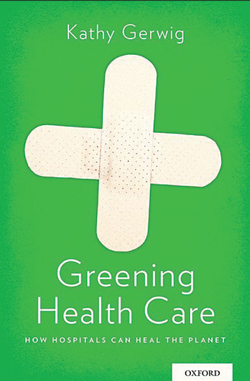BY: SR. SUSAN VICKERS, RSM AND SR. MARY ELLEN LECIEJEWSKI, OP
 Greening Health Care: How Hospitals Can Heal the Planet
Greening Health Care: How Hospitals Can Heal the Planet
By Kathy Gerwig Oxford University Press, 2015 260 pages, $26.55
REVIEWED BY SR. SUSAN VICKERS, RSM AND SR. MARY ELLEN LECIEJEWSKI, OP
Hospitals can be places of healing and hope. But in 2001, Kaiser Permanente's environmental stewardship leader, Kathy Gerwig, visited a neonatal intensive care unit (NICU), an amazing environment full of tiny, preterm and critically ill infants, that left an indelible mark on her memory. Babies enclosed in sterile plastic bubbles. Highly specialized clinicians conferring with colleagues. Parents exhausted from lack of sleep. Was there any hope? Were the treatments and the equipment safe for these tiny patients?
"We had no way of knowing whether our polyvinylchloride (PVC)-based equipment might be harmful to patients, especially to susceptible newborns who often receive multiple and prolonged treatments with PVC-based medical devices," Gerwig writes in Greening Health Care: How Hospitals Can Heal the Planet. "I decided that it was time to find out just how much equipment in our NICUs might be suspect."
The quest for a sustainable health care system in Greening Health Care is one shared by a growing number of hospitals and hospital systems, group purchasing organizations, nongovernmental organizations and business partners. Whether the focus is on healthy food or less waste, safer chemicals or green buildings, environmentally preferable purchasing or measuring and reporting, Gerwig offers a glimpse into the creativity, tenacity and collaboration that have gone into "building the scaffolding of a green health care system," as Gary Cohen, founder of the Health Care Without Harm advocacy group, notes in the book.
"The greening of health care is a lesson of hope," Gerwig writes in the preface. "And the future of health care holds a promise of planetary healing that extends far beyond the system of health care." Inspiration, a sense of hope and an urgent call to action are everywhere evident in Greening Health Care.
In the book we learn of Kaiser Permanente's first steps toward sustainability — the indelible mark left by Silent Spring author, Rachel Carson, as she spoke in 1963 to 1,500 Kaiser Permanente physicians and researchers, voicing concern for the interdependence of human and environmental health.
Kaiser joined the then-new Health Care Without Harm, created regional green teams that focused on waste reduction, implemented a sustainable energy policy, moved to renewable energy sources and designed healthier hospitals. Aware of the crucial impact that healthy food and sustainable food systems have on our health, Kaiser led the way in birthing the very first hospital-based farmers' markets in the country that served only organic produce. This celebration of local and healthy food systems continues to unfold in health systems around the country.
Kaiser was not shy about firmly committing to purchase green electronic equipment and advocating for safer chemicals. Furthermore, Kaiser understood the gravity of the health risks posed by climate change and took action to minimize their greenhouse gas emissions and to advocate for public policy to address the issue nationally and globally.
A sense of pride and honor for Kaiser's environmental history and in the direction it is going comes through very clearly in the book, but so does a sense of responsibility to the wider community. Kaiser shares the results of its learning, sustainability scorecards, eco-tool kits, policies and research. Greening Health Care cites leading practices and achievements from hospital after hospital across the country. There's a sense that Kaiser is very much aware of the importance of not doing this alone, but to be a part of something much larger.
The book introduces us to the wayfinders and visionaries who, ever aware of the challenges in these complex times, are making sustainable health care a reality. It takes us through the activities of the health systems who were early adopters of a variety of sustainable activities such as elimination of mercury-containing thermometers, programs that focused on reduction of products containing the chemicals PVC and DEHP as well as those that promoted sustainable farming and food choices and safer chemicals, in addition to tools for tracking and reporting progress and results. Making the business case for total health, Greening Health Care explores the determinants of health and the community benefit dimensions of sustainability initiatives.
Moving through the book, we are reminded of the far-reaching implications of our choices and actions as we continue to envision, create and build a sustainable health care system, one that is rooted in our exquisite awareness of the interconnectedness of all things. The challenge for our health care leaders, and all of us, is to "transform not just a single hospital or health system," Gerwig writes, "but the entire U.S. health sector to a deep and healthy shade of green." And to do that as if our health depended on it, as indeed it does.
SR. SUSAN VICKERS, RSM, is vice president, corporate responsibility, for San Francisco-based Dignity Health.
SR. MARY ELLEN LECIEJEWSKI, OP, is director of ecology for Dignity Health.